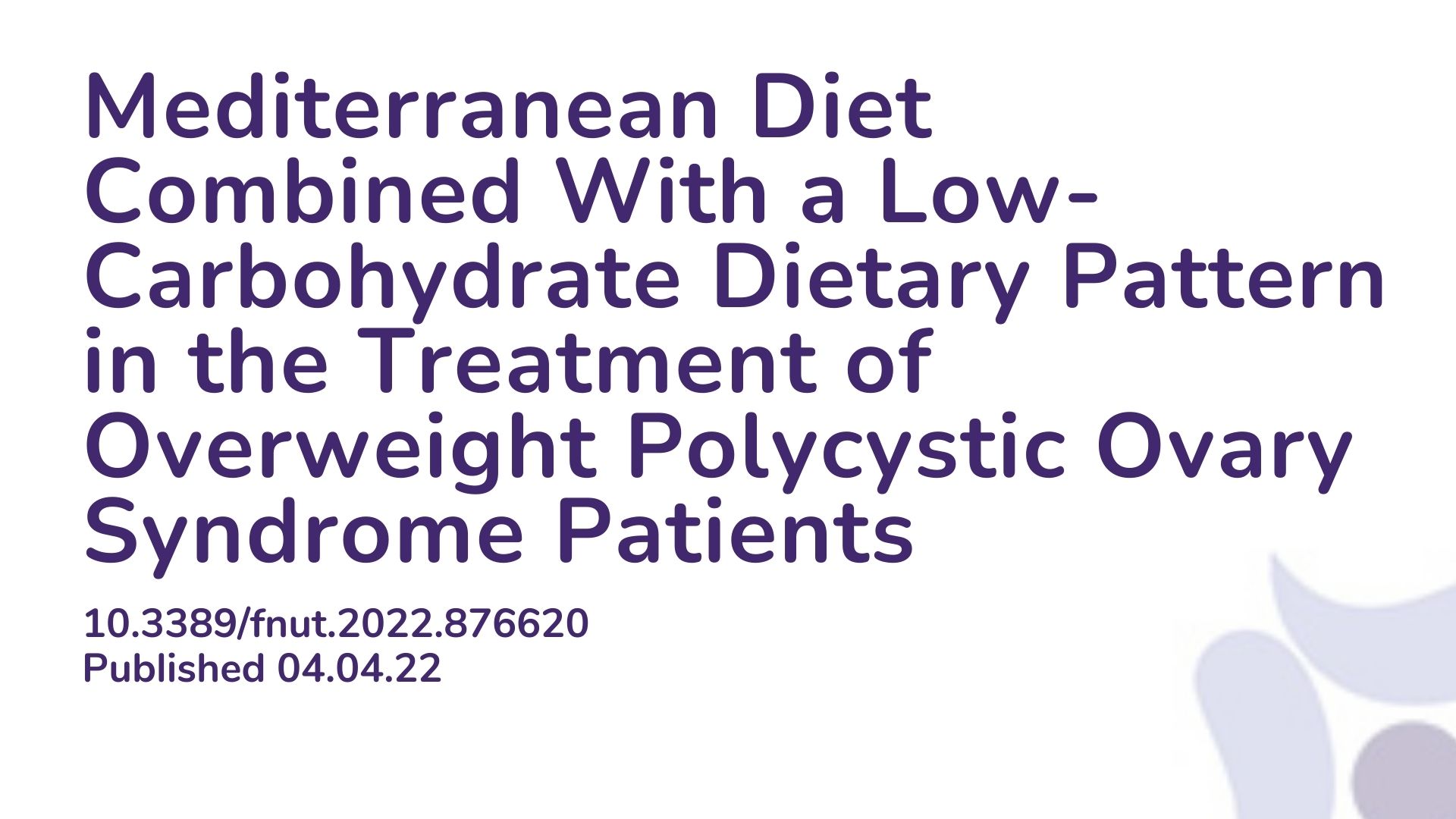Summary: The prevalence of insulin resistance (IR) in women with polycystic overian syndrome (PCOS) is 50-70%, with obese PCOS women accounting for approximately 75% of IR patients. This 12 week randomised controlled trial aimed to analyse the effects of two assigned dietary trends – a mediterranean/low carbohydrate diet (MED/LC), and a low fat diet. The study looked at multiple measures of body weight, fasting insulin and glucose, insulin resistance indexes, cholesterol, triglycerides, total testosterone, luteinizing hormone, follicle-stimulating hormone and prolactin. The results suggest that the MED/LC diet is a super diet to a LF diet for overweight PCOS patients. The MED/LC diet also significantly restored their menstrual cycle (86.7% of women reported normal menstrual cycles at the end of the study when engaging in the MED/LC diet), improved their anthropometric parameters and corrected unstable endocrine levels. The results of this study implicate the MED/LC diet as a clinical treatment for women who are overweight and have PCOS.
Abstract:
Objectives: To determine the therapeutic effect of a Mediterranean diet (MED) combined with a low-carbohydrate (LC) dietary model in overweight polycystic ovary syndrome (PCOS) patients.
Methods: In this 12-week randomized controlled clinical trial, 72 overweight patients with PCOS were randomly assigned to one of two energy-restricted dietary models: the MED/LC diet or the Low fat (LF) diet. After the intervention, the number of the two groups returned to normal menstruation was counted. Body weight, body mass index (BMI), waist circumference, waist-hip ratio (WHR), body fat percentage (BF%), serum fasting insulin(FINS), fasting plasma glucose(FPG), insulin resistance index (HOMA-IR), quantitative insulin sensitivity index (QUIKI), total cholesterol (TC) and high density lipoprotein cholesterol (HDL-C), low density lipoprotein cholesterol (LDL-C), triglyceride (TG), total testosterone (TT), luteinizing hormone (LH), follicle-stimulating hormone (FSH), and prolactin (PRL) were compared between 2 groups before and after intervention.
Results: MED/LC group had more significant reduction trend in weight (−6.10 ± 1.52 kg vs −4.79 ± 0.97 kg, P < 0.05), BMI (−2.12 ± 0.57 kg/m2 vs −1.78 ± 0.36 kg/m2, P < 0.05), WC (−6.12 ± 5.95 cm vs −3.90 ± 1.58 cm, P < 0.05), WHR (−0.06 ± 0.02 vs −0.03 ± 0.02, P < 0.05), BF% (−2.97% ± 1.78% vs −1.19% ± 0.91%, P < 0.05), TT (−0.20 ± 0.24 ng/mL vs 0.08 ± 0.11 ng/Ml, P < 0.001), LH (−5.28 ± 3.31 mIU/mL vs −3.39 ± 3.64 mIU/mL, P < 0.05), and LH/FSH (−1.18 ± 0.75 vs -0.66 ± 1.05, P < 0.05) compared with the LF group. In addition, FPG (0.05 ± 0.38 mmol/mL vs -0.50 ± 1.01 mmol/mL, P < 0.001), FINS (−4.88 ± 6.11 μU/mL vs −8.53 ± 5.61 μU/mL, P < 0.01), HOMA-IR index (−1.11 ± 1.51 vs −2.23 ± 0.25, P < 0.05), and QUIKI index (0.014 ± 0.016 vs 0.028 ± 0.019, P < 0.05) decreased significantly in the MED/LC group compared with the LF group. Comparing the changes in lipid parameters between the two groups (LF vs MED/LC), significant differences in TG (−0.33 ± 0.32 mmol vs −0.76 ± 0.97 mmol, P < 0.05), TC (−0.40 ± 1.00 mmol vs −1.45 ± 2.00 mmol, P < 0.05), and LDL-C (−0.41 ± 1.05 mmol vs −0.73 ± 0.76 mmol, P < 0.05) were observed.
Conclusion: The results of this study suggest that the MED/LC diet model is a good treatment for overweight PCOS patients, significantly restoring their menstrual cycle, improving their anthropometric parameters and correcting their disturbed endocrine levels, and its overall effectiveness is significantly better than the LF diet model. Therefore, this study recommends that the MED/LC diet model can be used in the clinical treatment of patients with overweight PCOS.
Article Publication Date: 04.04.22
DOI: 10.3389/fnut.2022.876620



